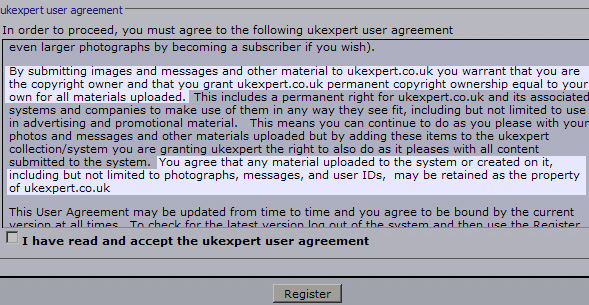
We’ve talked about how photo licencing works before, but it seems as if people are just not learning their lessons. So, as the newest instalment in our Photography Business article series, an important reminder…
The newest horror story comes from a website called UK Expert. If you sign up to their website, and click ‘ok’ on the terms as conditions (Let’s face it – when did you last read the terms and conditions to anything), they are trying to get you to sign over the copyright to your photos. Yikes!
The lesson today?
Read the terms and conditions
before you upload any photos.
Seriously.
Today, Geir tipped me about the problem with UK Expert, a photo competition website. While they aren’t the only ones doing that out there, they are among the naughtiest I have come across. In their terms and conditions portion of their Registration process, they’ve got the following to say about copyright:

By submitting images and messages and other material to ukexpert.co.uk you warrant that you are the copyright owner and that you grant ukexpert.co.uk permanent copyright ownership equal to your own for all materials uploaded.
I can understand the reasoning for part 1 of this: If you don’t have the right to use a photo, you are committing breach of copyright if you upload the material. (However, there are situations where copyright owners are not allowed to use material — such as when the material is already under exclusive licence — and there are situations where it is perfectly fine to upload material, even if you don’t own the copyright)
It’s the second part that is scary though: “you grant ukexpert.co.uk permanent copyright ownership” is a sneaky, nasty way of trying to steal the copyright to an item from a photographer. They are a competition website, and it’s fair to think that people would upload their best photos, in order to try and win the competitions. Imagine losing the copyright to all your best photographs — how would you feel?
You’re in luck, though, because they also write the following in their terms and conditions: “ukexpert is based in England, and English law applies.” What they are doing is, in fact, unlawful under UK copyright law: It is impossible to re-assign the ownership of copyright without an explisit, written contract. Checking a box on a website doesn’t constitute such a contract, so you haven’t given away anything.
However, if you do have any photos uploaded on UK Expert, I’d remove them as soon as you can. Don’t let them get away with trying to steal your photos from you!
So — yet again — make sure you know what you are signing up for, know your rights, and if you believe the licensed use for the material you upload is too broad, just walk away. Guys like this don’t deserve your photos.
Getting your photos removed
So, what do you do when you’ve already uploaded your photos, and want to take them down?
Over on Pixalo, a poster is lamenting the fact that it’s nearly impossible to remove your own photos from the site. To check this out for myself, I set up an account and uploaded a photo, and was unable to figure out how to remove it. If there is a way, there’s no easy way, which sounds a little bit on the shady side to me.
The best tip I can give you, is to report your own photo for a violation, and write “I revoke the licence for the use of this photo, effective immediately. Please remove it within 24 hours”.
24 hours later, if the photos aren’t gone, write a NTD (Notice and Take Down). This is a legal request in which you are demanding a website to remove the copyrighted material from their site. The fact that you own the copyright means that you can revoke the license for the use of the photos. In fact, you already did (when you warned them 24 hours ago), so now, they are in breach of copyright!
If they still don’t take the photos down within a ‘reasonable time’ (which I would say is about 1 working day, but that’s a bit fluid), you are actually legally entitled to go after the ISP or hosting company of the website in question. Serve them the ‘notice and take down’, and the hosting company will pull the plug on the website.
A lot more information about how this all works is available on the Cambridge University website (scroll down to Copyright and other laws, but make sure to read the rest of the page as well). Examples of NTDs, and more information on how to write one, are available on-line.
Important notice: I not use any information on this web site as actual legal advice. If you do find yourself in a situation where you need to turn to the law to protect your intellectual property rights, get a solicitor involved. And make sure to file a claim against the company involved for any costs incurred (in the small claims court if you have to) — including the cost of your solicitor.







